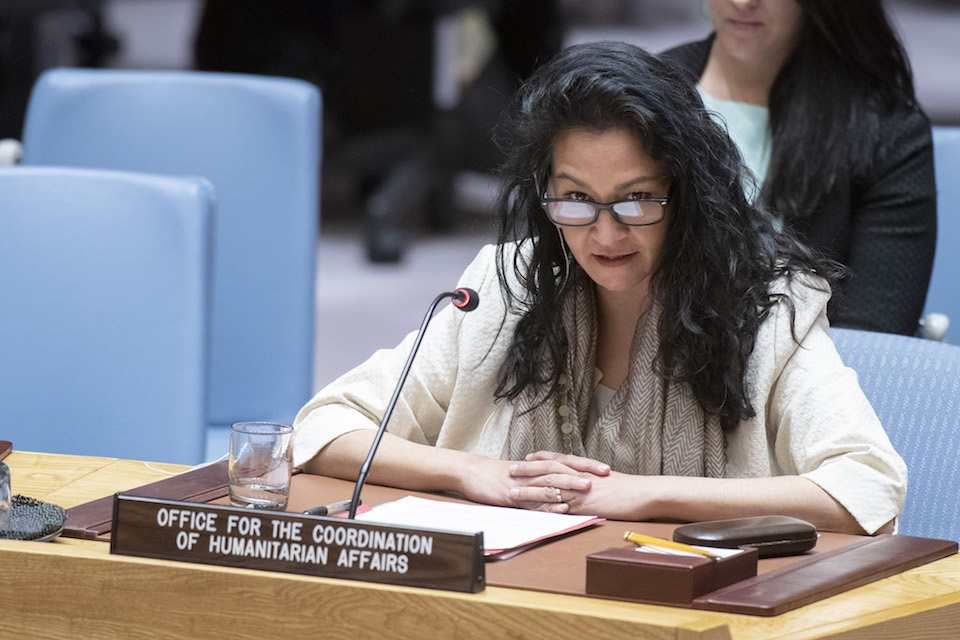The humanitarian situation in Rukban
Statement by Stephen Hickey, UK Political Coordinator at the UN, at the Security Council Briefing on Syria

Thank you Mr President. First, let me thank Reena Ghelani for her briefing and also pay tribute through you to all the UN staff doing such important humanitarian work in Syria.
Mr President, Ms Ghelani today has reminded us that the humanitarian situation in Syria remains grave. We can not afford to lose sight of the 12 million people suffering daily. Eighty percent of Syrians live below the poverty line and one third of the population does not have reliable access to affordable food. This Council must therefore step up its efforts to ensure that humanitarian assistance reaches those who need it throughout Syria. And also we must do much more to support UN-led efforts to end this conflict through a political process.
Mr President, I agree with all the remarks made today by Belgium on behalf of the three humanitarian co-penholders but I wanted to highlight three points: the situation in Rukban, the situation in regime-held areas and Idlib.
First, on Rukban: the UK welcomes the news that an urgently needed humanitarian convoy finally reached Rukban on 6 February delivering assistance to thousands of people in desperate need. This situation of over 41,000 people sheltering in Rukban remains a serious concern. We must not see the same repeated delays before the next convoy, which the UN has now requested. The UN-conducted intentions survey in Rukban shows that the majority of residents wish to leave the camp but it also highlights their fears and concerns about doing so. Many are worried about their safety and security if they choose to return to their homes. Lack of civil documentation and concerns about access to their property were also reported. These concerns need to be addressed before people move.
The UN is therefore right, as are our humanitarian penholders, to call for certain conditions to be in place beforehand and any return or relocation must be safe, voluntary and dignified. Any effort to assist in the relocation of the population of Rukban must be in line with international protection standards. UN humanitarian staff should be granted access to the population before, during and after any movement. Children, women, the elderly and persons with disabilities must be afforded special protection during all phases of relocation. Screening procedures must be conducted in accordance with international law.
Mr President, turning to my second point about the situation in regime-held areas. The UK remains deeply concerned at conditions in former opposition held areas that the regime now controls. The Russian ambassador spoke of steps by the regime to welcome back refugees to areas under regime control. But Mr President, you don’t welcome back refugees by arbitrarily detaining them in conditions in which torture is systematic and rife. You do not welcome back refugees by forcing them to join the army and to fight in a conflict which they have fled. And you don’t welcome back refugees by threatening to seize their properties under Law Number 10.
Mr President, all of these reasons were cited by Syrians themselves, under the UN’s recent survey, as reasons for why they are not returning to regime-held areas. This is clearly not an environment for safe, dignified and voluntary refugee return. And it clearly falls short of this Council’s call in Resolution 2254 for the establishment of inclusive and non-sectarian governance in Syria. Three quarters of those communities that came under regime control in 2018 are considered hard to reach areas for aid.
Let us be clear: they are only hard to reach because the regime chooses not to allow necessary aid to reach those that need it. We therefore join our French colleagues in calling on the regime to allow unfettered humanitarian access to all of those people in areas which it controls.
Third, Mr President, on the situation in Idlib, we remain deeply concerned for the 3 million people in northwest Syria - over 2 million of whom are entirely reliant on cross-border aid. And we should remember when we talk about the threat from terrorism in Idlib that there remain more babies than terrorists in Idlib. Fifty per cent of the population have been displaced from their homes, sometimes multiple times, stretching scarce resources beyond their limits and putting further strain on host communities. We’ve heard today from Ms Ghelani that military escalation in Idlib Province would have catastrophic humanitarian consequences. We therefore call on all parties, but in particular the regime and Russia, to respect the ceasefire and facilitate humanitarian access to Idlib.
Mr President, finally I would like to echo the points made by my South African colleague, humanitarian co-penholders and almost all other speakers today about how we will only tackle this humanitarian crisis in Syria in the long term through a political solution in accordance with Resolution 2254. This means in practice: a political transition. It means the establishment of a credible, inclusive, non-sectarian governance, which we know is so sorely absent in Syria today. And as my Belgian and Polish colleagues have emphasized, it also means accountability for the war crimes and crimes against humanity that have been carried out by this conflict - in particular by the regime and by Daesh.
Thank you Mr. President.